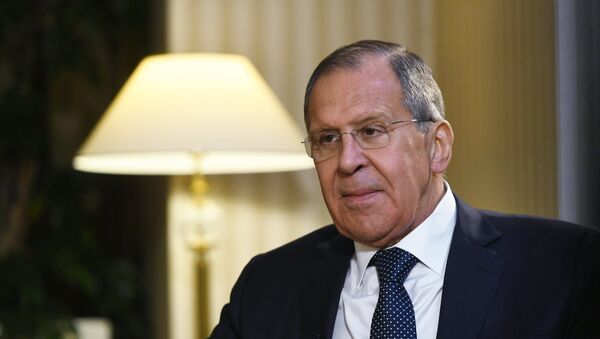"I have already mentioned that we have contacts with American diplomats and the military. There is a so-called deconfliction channel on Syria to reduce risks of unintentional incidents. It works on a regular basis. There are also such consultations, which are not widely reported, but they continue with regard to various aspects of the Syrian settlement", Lavrov said in an interview with Vietnam Television, China Television and Phoenix Television in the run-up to his visits to China and Vietnam.
According to the minister, such a dialogue is necessary to prevent unwanted incidents since the United States retains a military presence in Syria, albeit without the consent of the legitimate government.
"Now it is all the more necessary, given the announcement that the United States will withdraw its troops from Syria. It is unclear how and when. Many actually doubt whether they will do it. However, such a dialogue is useful. It is heartening that the United States remains committed to the implementation of UN Security Council Resolution 2254, the main meaning of which is that it is up to the Syrians to hold talks and decide without external pressure", he noted.
READ MORE: Iranian FM Not Ruling Out Military Action Against Militants in Syria's Idlib
The statement comes after US President Donald Trump told reporters on 22 February that Washington is not changing its course in Syria amid a decision to leave some 400 troops in Syria beyond the pullout. The US, which has been operating in Syria for years, decided to withdraw its forces in December.
Syrian-Turkish Buffer Zone
The minister further elaborated that the military was currently finalising talks on the format of a buffer zone along the Syrian-Turkish border taking into account both Damascus' and Ankara's interests.
"There have been talks about creating a buffer zone on the basis of the agreement that was signed between Turkey and Syria in 1998. It is an agreement on cooperating to eradicate terrorist threats on the joint border, including the possibility of the Turkish side to act on certain parts of the border on Syrian territory. Now the final format of this buffer zone is being agreed with the participation of the military, while, of course, taking into account the position of Damascus and taking into account the interests of Turkey as much as possible", Lavrov said.
According to the minister, "we are not talking about any joint military activities".
"In principle, we have experience when agreements on the ground on a ceasefire, compliance with security measures and the creation of de-escalation zones were accompanied by the deployment of the Russian military police. This is still possible for the aforementioned buffer zone. But once again I emphasize that the military is now completing the agreement on the details while taking into account the positions of Damascus and Turkey", Lavrov added.
READ MORE: Turkish Defence Minister Warns Pentagon Against Vacuum of Power in Syria —Report
Kurdish Issue
Moscow understands Turkey's concerns over the Kurdish issue in the northeast of Syria but the two states still lack consensus on which Kurdish groups operating in the country should be considered terrorists, Russian Foreign Minister Sergei Lavrov stressed.
"We do not have a common vision of who among the Kurds should be regarded as terrorists… We understand its [Turkey's] concerns but it is still necessary to separate wheat from chaff to see which one of the Kurdish groups is indeed an extremist one and poses a threat to the security of the Turkish Republic", Lavrov told reporters.
The comments come after Erdogan threatened last year to conduct a military campagin against the Kurdish-majority Syrian region controlled by the YPG militia, who Ankara sees as part of the banned separatist PKK movement. He said he had delayed the military operation after a phone call with Trump in mid-December.
Afghan Settlement
Russian Foreign Minister Sergei Lavrov went on to say that the United States maintains contacts with Russia on the Afghan conflict settlement and itself initiates them.
"Afghanistan is also a direction of the foreign policy agenda, where the Americans maintain contacts with us and themselves initiate them", Lavrov stated.
The minister recalled that US Special Representative for Afghanistan reconciliation Zalmay Khalilzad had held several rounds of talks with Russian Deputy Foreign Minister Igor Morgulov, while publicly assessing Moscow’s efforts with regard to the Afghan settlement, including the "Moscow format" of talks as positive.
READ MORE: Gromov on Afghanistan: US Did Everything to Halt Soviet Pullout or Ensure Losses
"As you know, the United States is regularly invited to [take part in] this format, but at least during the October meeting, they thought fit to decline the invitation. I am sure that when we go ahead with such meetings, we will continue inviting US representatives", Lavrov added.
Earlier, Russia's Special Presidential Envoy for Afghanistan Zamir Kabulov stated that Washington had communicated a readiness to start a dialogue about practical cooperation with Moscow in combating Daesh* and al-Qaeda* in Afghanistan.
*Daesh (also known as ISIS/ISIL/IS), al-Qaeda are terrorist groups banned in Russia



